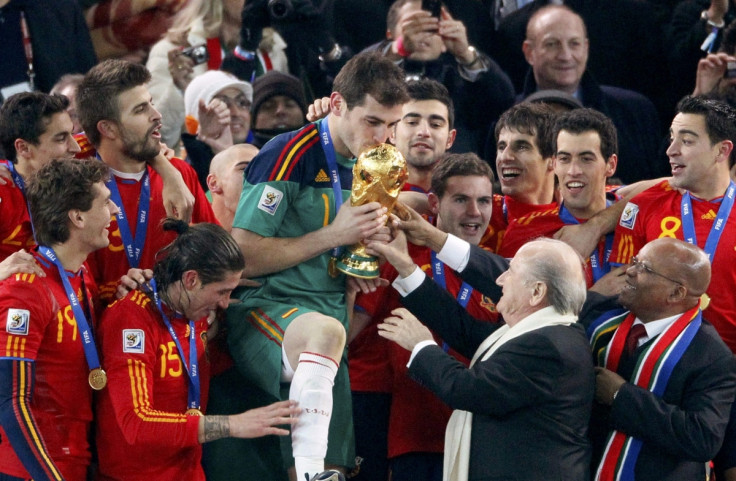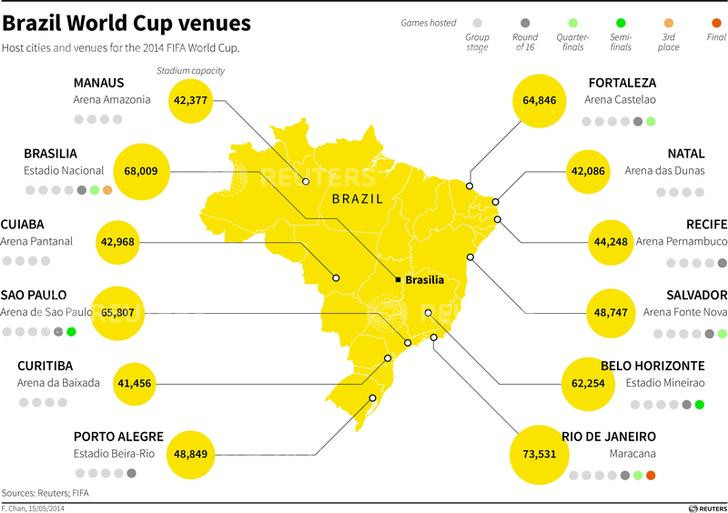Fifa World Cup 2014: All You Need to Know

The 20th edition of the Fifa World Cup will begin on 12 June with host nation Brazil taking on Croatia in the competition's curtain-raiser at the Arena Corinthians in Sao Paulo.
The biggest event in world football will kick off this Friday and will end on 13 July when the final will be held at the iconic Estádio Maracanã, Rio de Janeiro.
IBTimes UK brings you all you need to know about the 2014 Fifa World Cup.
Participating Teams
This year's edition of the World Cup features 32 nations vying to be crowned world champions. The participating teams are from five different confederations from across the globe with 13 from Europe's Uefa, four from the Asian Football Confederation (AFC), four from CONCACAF which represents north American, central American and Caribbean sides, six from South America's CONMEBOL and five repesenting the Confederation of Africa (CAF).
Point System
The point system comes into the picture only during the group stages. The team that wins the game will be awarded three points, while a draw earns each side a single point. No points are awarded in the case of a defeat.
Group Stages
The 32 teams have already been drawn into eight groups, with each group consisting of four teams. The draw was conducted last December and all the teams are allocated in Group A to Group H.
Each team will take on the three nations in their respective group during the first round of the World Cup. The top two teams from each group then qualify for the knock-out phase of the tournament, as the remaining two go home early.

Knock-Out Phase
Following the group stage, teams will enter the round of 16, the quarter finals, semi finals and then the final. From this round onwards, the losing team will be eliminated from the tournament, while the winner will progress to the next stage.
In the knock out phase, if there is no result after the regulated 90 minutes of play the game will be forced into half an hour of extra time. Should there still be no winner the game will be decided by a penalty shootout.
During the round of 16, the top two teams from each group will already know their fate following the conclusion of the group stage. The winner of Group A will face the runners up of Group B, while the winner of Group B will take on the runners of Group A. The same process will continue with Group C and D, Group E and F, Group G and H.
Should they survive the round of 16, the two winners of Group A and Group B will face each other in the quarter finals of the tournament. Similarly, the process will go on with the winners of the round of 16 tie of Group C and D, Group E and F, Group G and H facing each other.
The last four teams will progress to the semi-final, before the two winners face each other on 13 July in the final in Rio de Janeiro. The two losing semi-finalists will fight for third place.

Venues
This year's World Cup will see 12 cities in Brazil hosting 62 games from 12 June to 13 July. The 12 venues are Estádio do Maracanã, Estádio Nacional, Arena de São Paulo, Estádio Castelão, Estádio Mineirão, Estádio Beira-Rio, Arena Fonte Nova, Arena Pernambuco, Arena Pantanal, Arena da Amazônia, Arena das Dunas and Arena da Baixada.
Squad
Each team has already finalised a squad of 23 players, with a mandatory rule ensuring each side has included three goalkeepers. The teams should confirm their 23-man shortlist no later than 10 days prior to the start of the tournament.
© Copyright IBTimes 2025. All rights reserved.






















